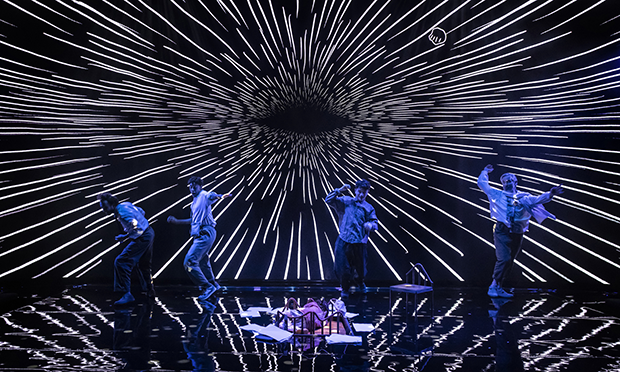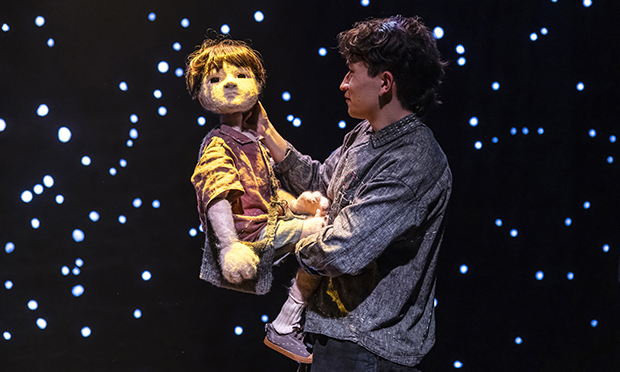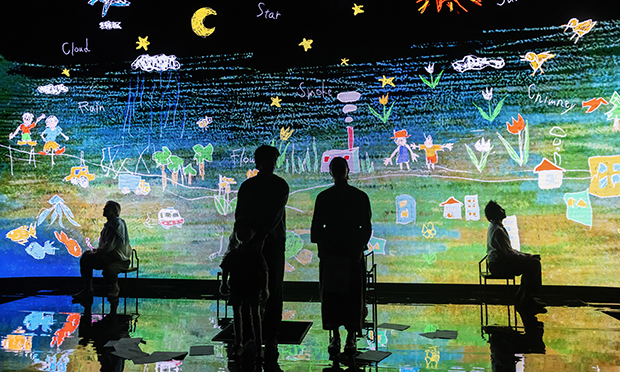‘It’s a real adaptation’: Team behind Our Cosmic Dust on bringing the award-winning play from Tokyo to London

Our Cosmic Dust at Park Theatre. Image: Pamela Wraith Photography
Shotaro is an adventuresome schoolboy who sets out on a quest to find what has happened to his late father.
As he journeys – and his mother goes looking for him – people recount their own stories of life and loss.
Our Cosmic Dust is a lyrical tale of grief and solace, told via an innovative combination of puppetry and LED lights.
Written and directed by Michinari Ozawa, the play premiered in Tokyo two years ago to great acclaim.
Now an adaptation by Susan Momoko Hingley has brought the innovative drama to the Park Theatre, with Hiroki Berrecloth in the lead role.
As the play kicks off a five-week run, I caught up with the team behind the production to ask how they thought Shotaro’s story would resonate with a London audience.
SB: Bringing the play to the Park Theatre, were there any particular themes that you were really interested in getting across to the local audience here?
Director Michinari Ozawa: The baseline of this story is about a son who lost his father. He disappears one day, and the mother starts to look for her son. They talk to the people in the town, and they listen to their stories and their ideas about where people go after death, ideas about life and death. They think about identities through listening to these people; so the story elaborates the sense of identity that comes from where you grew up, and that affects how you think.
People who have lost something or someone who’s very important for them – that’s a universal story.

The production involves puppetry. Image: Pamela Wraith Photography
SB: Can you explain how all the elements of the production relate to the themes that you’re trying to get across in the play?
Ozawa: What I think is very important is communication. In this day and age with social media and everything, I feel like people have stopped having pure communication with each other; it’s all about ‘me, me, me’. I think they are not listening to other people.
I really want to communicate with the audience about communicating. So puppetry is an element for me to show something. An actor touches the puppet, that’s when the puppets starts to move, that’s when the puppet is given life.
So this is a kind of basic communication that one person needs to ask a question for the other person to answer the question.
SB: Have you encountered any frictions or problems in translating Japanese cultural themes for a UK audience?
Translator Susan Momoko Hingley: We’ve been working on this for about a year and a half, and we decided we wanted this not to be set in Japan, and we wanted it to have a diverse cast. And so my main task, other than just translating the play into English, was to try and find the right contextual parallels, which would work in Britain. So a lot of the text – jokes, context – has been changed so that we would understand it here.
It’s been really fascinating, and really fun to try and work out what the parallels are, or what are the differences are and try and make them land. There’s been lots of the actors pitching in ideas and going ‘we don’t quite understand that’ or ‘I think this would work better’.
The characters and the structure of the play and the story are exactly the same, but a lot of the details have been changed to work for the British audience.
It’s not just a little translation; it’s a real adaptation. So even if people in Japan who’ve seen the original come and see this, I think they’ll find it fascinating too and I think it’s something brand new.

Spectacle: performers on stage. Image: Pamela Wraith Photography
SB: Is there anything that you’ve been able to do with the character you’re playing to try to relate to different age groups?
Actor Hiroki Berrecloth: From a personal point of view, grief for me came just three or four years ago, it was my first encounter with grief. Now, I know certain people have that experience much earlier and certainly, we’ll all have that experience.
I think a universal aspect of this show reminds us that no matter where you come from, or the age you are or the demographic you’re part of, there’s a commonality in that experience of grief. This is something adulthood can’t prepare you for. Everyone kind of becomes a child again in grieving, to cope.
What we see in this play, we see lots of different characters at different ages from different communities, different worlds, being able to share that. So what I hope the audience feel as they share the space with us is that people they don’t know sat left or right of them and the people on the stage, we are all connected in that experience, or will be connected in that experience.
Our Cosmic Dust runs until 5 July at Park Theatre, Clifton Terrace, Finsbury Park, N4 3JP.
